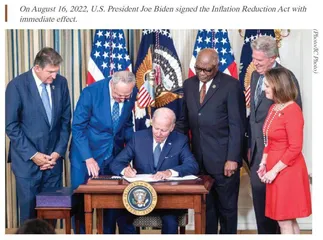How Biden Administration’s Economic Policy Affects U.S.-Europe Relations
作者: Zhao Huaipu

Since taking office, the Biden administration has introduced policies to expand domestic spending and spur economic growth in the face of deep domestic division and increasingly intense international political and economic competition. It has revived state interventionism in an attempt to gain competitiveness through new industrial policies and to foster a new international economic governance and control system. The ultimate goal is to consolidate the basis for long-term growth and competitive advantages. Biden’s nationalist and expansionary economic policy which serves the U.S. strategy of great power competition has added to the uncertainty in international relations. Its Inflation Reduction Act has been questioned and opposed by many for its discriminatory and protectionist overtones, bringing adverse impact to U.S.-Europe relations in particular.
Biden’s Economic Policy with Overtones of “America First”
The U.S. has seen its economic advantages waning and global standing plummeting in the wake of the 2008 financial crisis. In response to the evolving international environment, it has adjusted its international strategy and economic policy. Trump’s “America First” protectionist policy marks a turning point of U.S. economic policy against the backdrop of globalization backlash. With its radical economic policy, the Trump administration attempted to reshape the global industrial chain, create employment by bringing the manufacturing sector back home, protect the interests of American workers and businesses and buoy the American economy. Its strategy of trade protectionism and economic nationalism targeted not only China but also any other country or group that might compete with the U.S., the EU included.
Since Joe Biden took office, it seems that the protectionist rhetoric has been largely replaced by emphasis on WTO rules and WTO role. To ease economic and trade relations with the EU, some compromise was made and agreement on steel and aluminum was reached between the two sides through consultations and negotiations. Despite these positive changes, the Biden administration can hardly alter the logic of “America First” and has limited room for policy adjustment. The WTO Appellate Body to which new appointments had been blocked by the U.S. under Trump remains paralyzed with Joe Biden in office. The current administration even tries to infiltrate WTO negotiations with the Democratic Party platform such as addressing forced labor on fishing vessels in fisheries subsidies negotiations. At the same time, it continues Trump administration’s proposal of adding environmental factors into the consideration of anti-subsidy investigation. All these have only made negotiations more complex and difficult. As a matter of fact, goodwill to the WTO and easing of trade relations with the EU is practically a means for the Biden administration to reshape America’s image as champion for the multilateral trading system and to strive for more cooperation with others -- Europe in particular.
Under the shadow of Trumpism, the current Administration’s economic policy is inevitably constrained by domestic factors. The proclaimed return to multilateralism and international cooperation is nothing more than a means to the end of maintaining American leadership and hegemony. Despite differences in specific policy measures, the underlying logic to seek “America First” does not and will not change. A living example is the Inflation Reduction Act.
Inflation Reduction Act and European Response
In August 2022, a Federal Act covering taxation, health and climate change was passed by the U.S. Congress, which will direct $ 430 billion over the coming 10 years toward addressing climate change, developing clean energy and shoring up health care, including a record $369 billion funding for climate and energy expenditure. The package, known as the Inflation Reduction Act (IRA or the Act), aims to curb inflation by reducing the deficit, making Medicare more affordable and investing in sustainable energy, and is considered the largest climate bill in history. It is estimated that by 2030, the Act will cut greenhouse gas emissions by about 40% below 2005 levels. The IRA at first blush looks like a much-needed, positive legislation for America and the world, but a closer look reveals that it may cause more problems than it solves. Under the Act, the U.S. government will provide huge subsidies for green businesses whose production is mainly done in the country, with a focus on the homegrown electric vehicle industry. A $7,500 subsidy (tax credit) is offered to consumers purchasing electric vehicles (EVs) whose critical components such as batteries are produced and assembled within the U.S., excluding EVs made in other countries, in a bid to promote domestic EV production and application of green technologies and boost the economy by gaining a competitive advantage over other countries. The Biden administration also aims for global leadership, hoping that the Act can make America “again” a leader in global climate policy.
Nonetheless, the Act has sparked considerable controversy across the world, as it intends to foster an environment favorable only to the U.S. through protectionist measures and to alleviate its economic woes such as high inflation. America’s allies in Europe and Asia (Japan and South Korea) have criticized it as a violation of WTO rules and manifestation of trade protectionism. European Commission President Ursula von der Leyen said that the Inflation Reduction Act has received so much additional scrutiny in Europe and the rest of the world because it can lead to unfair competition, close markets and fragment global supply chains.